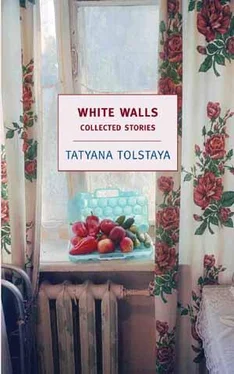Nina allowed Grishunya a final good-bye to his friends, and the innumerable horde poured in for the farewell supper—girls and freaks, old men and jewelers. Three balletic youths with women’s eyes arrived prancing on turned-out toes, a lame man limped in on crutches, someone brought a blind boy, and Lizaveta’s now nearly fleshless shadow flitted about. The crowd kept coming; it buzzed and blew around like trash from a vacuum cleaner hooked up backward; bearded types scurried past; the walls of the little house bulged under the human pressure; and there were shouts, sobs, and hysterics. Dishes were broken. The balletic youths made off with the hysterical Agniya, catching her hair in the door; Lizaveta’s shadow gnawed her hands to shreds and thrashed on the floor, demanding to be walked all over (the request was honored); the deacon led the Tungus into a corner and questioned him in sign language on the faith of his people, and the Tungus answered, also by signs, that their faith was the best of all faiths.
Grisha beat his porcelain brow against the wall and cried out that fine, all right, he was prepared to die, but after his death— you’ll see—he’d come back to his friends and never be parted from them again. The deacon didn’t approve of such proclamations. Neither did Nina.
By morning all the scum had vanished, and, packing Grishunya into a taxi, Nina carried him off to her crystal palace.
Ah, who could possibly paint a portrait of one’s beloved when, rubbing his sleep-filled blue eyes and freeing a young, hairy leg from beneath the blankets, he yawns with all his might. Entranced, you gaze at him: Everything about him is yours, yours! The gap between his teeth, and the bald spot, and that marvelous wart!
You feel you’re a queen, and people make way for you on the street, and your colleagues nod respectfully, and Arkady Bori-sovich politely offers you his hand, wrapped in sterilized paper.
How fine it was to doctor trusting patients, to bring home bags full of goodies, to check in the evenings, like a solicitous sister, to see what Grishunya had written during the day.
Only he was a frail thing: he cried a lot and didn’t want to eat, and he didn’t want to write neatly on clean paper but, out of habit, kept on picking up scraps and cigarette packs, and doodling or else just drawing flourishes and curlicues. And he wrote about a yellow, yellow road, on and on about a yellow road, and high above the road hung a white star. Nina shook her head: “Think about it, sweetheart. You can’t show poems like that to Comrade Makushkin, and you should be thinking about your book. We live in the real world.” But he didn’t listen, and kept on writing about the road and the star, and Nina shouted, “Did you understand me, sweetheart? Don’t you dare write things like that!” And he was frightened and jerked his head about, and Nina, softening, said, “Now, now, now,” and put him to bed. She fed him mint-and-lime-blossom tea, infusions of adonis and motherwort, but the ungrateful man whimpered and made up poems that offended Nina, about how motherwort had sprouted in his heart, his garden had gone to seed, the forests had burned to the ground, and some sort of crow was plucking, so to speak, the last star from the now silent horizon, and how he, Grishunya, seemed to be inside some hut, pushing and pushing at the frozen door, but there was no way out, there was only the pounding of red heels in the distance…. “Whose heels are those?” demanded Nina, waving the piece of paper. “I’m just interested—whose heels are they?”
“You don’t understand anything.” Grishunya snatched the paper.
“No, I understand everything perfectly well,” answered Nina bitterly. “I just want to know whose heels they are and where it is they’re pounding.”
“Aaa-agh!!! They’re pounding in my head!!!” screamed Grishunya, covering his head with the blanket, and Nina went into the bathroom, tore up the poems, and scattered them into the watery netherworld, the little domestic Niagara.
Men are men; you have to keep an eye on them.
Once a week she checked his desk and threw out the poems that were indecent for a married man to compose. And once in a while she would rouse him at night for interrogation: was he writing for Comrade Makushkin, or was he shirking? And he would cover his head with his hands, lacking the strength to withstand the bright light of her merciless truth.
They managed this way for two years, but Grishunya, though surrounded by every care and concern, did not appreciate her love, and stopped making an effort. He roamed the apartment and muttered—muttered that he would soon die, and the earth would be heaped over him in clayey, cemeterial layers, and the slender gold of birch coins would drift over his grave mound like alms, and the wooden cross or pyramid marker (whichever they didn’t begrudge him) would rot beneath the autumn rains, and everyone would forget him, and no one would visit, only the idle passerby would struggle for a moment to read the four-digit dates. He strayed from poetry into ponderous free verse as damp as pine kindling, or into rhythmic lugubrious prose, and instead of a pure flame a sort of white, suffocating smoke poured from his malignant lines, so that Nina coughed and hacked, waved her hands about, and, choking, screamed, “For heaven’s sake, stop writing!”
Then some kindhearted people told her that Grishunya wanted to return to his little house, that he had gone to see the custodian hired in his place—a fat woman—and bargained to see how much she would ask for handing him back his former life, and the woman had actually entered into negotiations. Nina had connections in the Municipal Health Department, and she dropped hints that there was a wonderful three-story building in the center of town, it could be taken over by an institution, hadn’t they been looking for something? Municipal Health thanked her, it did suit them, and very soon the little building was no longer a custodian’s lodge: the fireplace was torn out, and one of the medical institutes settled its faculty there.
Grisha fell silent, and for about two weeks he was quiet and obedient. Then he actually cheered up, took to singing in the bath and laughing—but he completely stopped eating, and he kept going up to the mirror and pinching himself. “What are you so cheerful about?” Nina interrogated him. He opened his identity card and showed her the blue margins freshly stamped with fat lilac letters reading “Not Subject to Burial.” “What does that mean?” asked Nina, frightened. Grishunya laughed again and told her that he had sold his skeleton for sixty rubles to the Academy of Sciences, that “his ashes he would outlast, and the worms elude,” that he would never lie in the damp ground, as he had feared, but would stand among lots of people in a clean, warm room, laced together and inventoried, and students—a fun crowd—would slap him on the shoulder, flick his forehead, and treat him to cigarettes; he’d figured it all out perfectly. And he wouldn’t say another word in answer to Nina’s shouts; he simply proposed that they go to bed. But she should keep in mind that from now on she was embracing government property and thus was materially responsible before the law for the sum of sixty rubles and twenty-five kopecks.
And from that moment on, as Nina said later, their love seemed to go awry, because how could she burn with full-fledged passion for public property, or kiss academic inventory? Nothing about him belonged to her anymore.
And just think what she must have gone through—she, a marvelous, ordinary woman, a doctor, who had indisputably earned her piece of the pie like everyone else, a woman who had fought for her personal happiness, as we were all taught to do, and had won her right in battle.
Читать дальше












